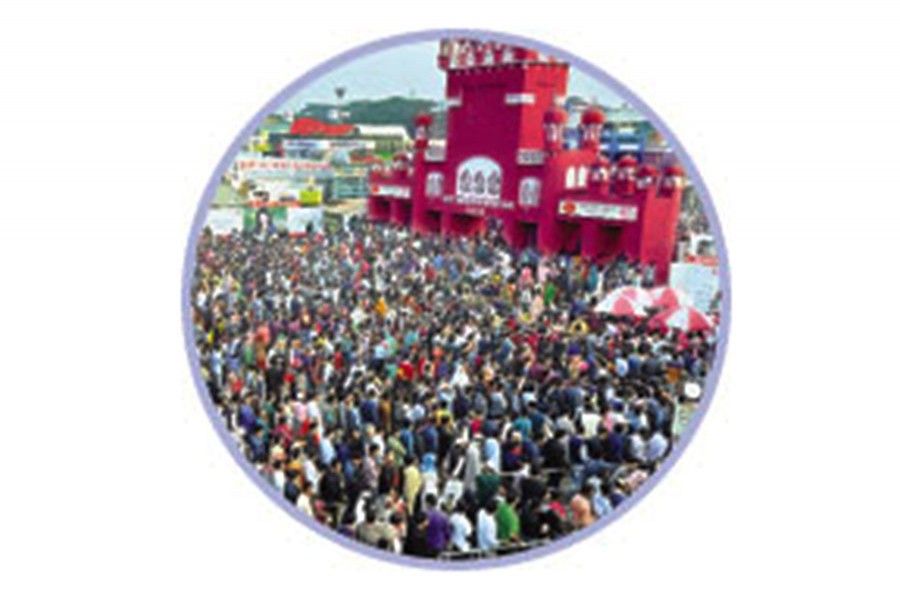Recently, Prime Minister Sheikh Hasina inaugurated the 26th edition of the Dhaka International Trade Fair (DITF), the largest yearly commercial and trade event of Bangladesh, which is going to be held at the mega Chinese-build new venue Bangladesh-China Friendship Exhibition Center in Purbachal. Every year, Bangladesh organises DITF arguing that it will promote exports which will ultimately contribute to the country's economic growth. On the other hand, some people say that it is just a waste of time and money. It is high time to analyse whether DITF can really contribute to the economic growth of Bangladesh.
Ever since the first trade fair was inaugurated on December 1, 1995, DITF was being annually held at Sher-E-Bangla Nagar in Dhaka till last year. The Export Promotion Bureau (EPB) along with the Ministry of Commerce are responsible for organising this exhibition. In addition to local companies, many foreign companies routinely participate in this event with general stalls, premium stalls, mega-pavilions, mini-stalls, and mini-pavilions. And, this year the fair has 23 pavilions, 27 mini pavilions, 162 stalls and 15 food stalls that have been permitted to differentlocal and international organisations.
As the government spends a huge amount on arranging DITF, it is important to assess the effectiveness and fruitfulness of this fair. Any international trade fair always hits vast dimensions of the economy which needs to be discussed in detail. Firstly, the DITF provides an exclusive opportunity to the companies, both local and international; regardless of their size, an opportunity to display their products and services to prospective local and foreign customers, business associations, and to the media. On the one hand, it opens a new window of opportunity for the local producers and suppliers to compete on a global level; and on the other hand, it contributes greatly to the sustainable economic development of the country by expanding the volume of exports, easing the path to enter the international market, and boosting the country's business confidence.
Secondly, DITF provides a neutral platform for doing business where it brings people from diverse departments, finance department, supply chain department, etc., of an organisation who can influence the purchase decision. And this is how it actually increases the probability of doing business by bringing people from different management levels to a single platform. Thirdly, apart from boosting sales, entrepreneurs can observe the real reaction of the consumers not only about their existing products but also about the upcoming products which they are planning to introduce in the market or have introduced recently. They can then assess these opinions, reactions and perceptions from the current and potential customers to conduct and evaluate the future market trend.
Fourthly, the DITF will help to develop a network among the local and foreign businessmen, buyers and sellers, distributors, suppliers and agents which will ultimately pipeline Bangladeshi products to the global market. This will help them not only to diversify the export products but also to diversify the export destinations. Fifthly, it will help organisations to collect information about their competitors such as competitors' upcoming products, pricing techniques, marketing, and promotional strategies. Most importantly, this will help the local companies to understand how foreign companies are penetrating into a new market with their products.
Seventhly, as many foreign companies are participating in the trade fair with new and innovative products, this will help the local entrepreneurs to have ideas about new products which they may introduce for Bangladeshi consumers with customised features. Eighthly, undoubtedly it is a great platform for local startup companies to promote their business and products with minimal or almost no cost at all to their prospective local and international customers. Finally, DITF increases money flow in the economy, as many people visit it and spend money for shopping, which makes the economy vibrant. And it will also increase foreign currency flow in the economy attracting tourists for business and for recreation purposes as well.
Although DITF has a huge untapped prospect to contribute to the economic growth, Bangladesh has failed to unleash its full potential. In order to create hype and promote DITF in foreign markets, the government should develop an attractive website with all the needed information and facilities available for foreigners. The government should ensure an active social media presence, especially on Facebook and Twitter, and boost the event in social media to have a wider outreach. The government may promote DITF along with the tourism sectors of Bangladesh among the foreigners by creating videos and promoting it on YouTube and mainstream TV channels.
DITF assists the potential exporters to launch their product and assess its potential in the international market. Besides on spot sales, it also helps the local businessmen to get business orders from abroad. The government and trade association should work tirelessly to remove all the hassles and address all the challenges such as lack of information, presence of fake and low-quality goods etc. To address its huge trade deficit and a negative balance in international trade, Bangladesh should promote the international trade fair to diversify the export basket, export destinations and boost exports.
The writer can be contacted at [email protected]


